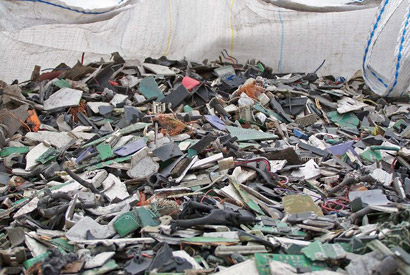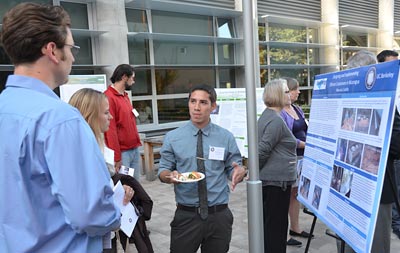Cal Energy Corps interns field-test smart solutions
More than 30 Berkeley undergrads shared experiences, adventures and insights from their summer internships during the second annual Cal Energy Corps symposium at the David Brower Center Thursday.

September 24, 2012
Recently returned from summer sojourns, 32 UC Berkeley undergraduates shared experiences and adventures interning on myriad sustainability projects around the world during the second annual Cal Energy Corps symposium at the David Brower Center Thursday.
Launched in 2011, the Cal Energy Corps provides undergraduates with practical research and experiential-learning opportunities through internships with partner organizations across the academic, corporate and nonprofit sectors. Modeled on the U.S. Peace Corps, the program aims to engage Berkeley students tackling alternative energy, climate change and sustainability issues around the world.
Administered by the Office of the Vice Chancellor for Research, the program selected 32 students to participate this year. The program also expanded placement opportunities by partnering with new organizations, including industry giants Bosch, Siemens and Suntech.
The majority of student researchers worked on a broad range of sustainability projects across nine different countries and four continents — from installing water filtration and solar panels in coastal villages in Nicaragua to analyzing the global solar market in China, evaluating European energy policy strategies in Germany and transforming human waste into biodiesel in Ghana. Interns also headed to Brazil, Hong Kong, India, Singapore and Taiwan.
Several of this year’s cohort remained in the Bay Area, interning on projects to improve agricultural-crop characteristics at Berkeley’s Joint BioEnergy Institute, researching carbon-capture strategies at Lawrence Berkeley National Laboratory and developing novel battery technologies at Alameda-based startup Imprint Energy.
Mauricio Castillo, a senior majoring in conservation and resource studies, interned in Nicaragua with BlueEnergy, a sustainable-development nonprofit co-founded in 2003 by Berkeley alumnus Mathias Craig.

Mauricio Castillo was on hand to talk about his internship with BlueEnergy in Nicaragua. (Roibín Ó hÉochaidh photo)
“Working so closely with the BlueEnergy team, I gained a real insight into rewards of development work and the challenges of running an NGO,” said Castillo, whose family comes from Nicaragua.
Working in the home of a local family that harvests wood from a distant forest for all its cooking and heating needs, Castillo designed, tested and installed an energy-efficient stove. The new stove will use up to 50 percent less wood and emit less smoke than the existing traditional open fire, expelling the most harmful particulates from the smoke-blackened kitchen through a new chimney.
“Every year, 2 million people die from the effects of smoke inhalation,” he explained. “It was really tough for me trying to work through all the smoke, so I can’t imagine what it’s like to have to do that everyday of your life.”
Larissa Korach, who recently completed her bachelor’s degree in mechanical engineering, spent the summer interning at the German headquarters of electrical engineering and electronics powerhouse Siemens.
Working in the sustainability division, the Los Angeles native performed lifecycle assessments for a range of company products. Calculating carbon footprints and modeling environmental impacts of all product inputs and phases helps designers implement changes to minimize impacts across the entire life of the product, from raw material to disposal.
“I learned a great deal about the whole lifecycle assessment process and product development and design as well as a lot of softer skills beyond my research focus,” said Korach, who has just started the master’s program in mechanical engineering at Berkeley.
The Cal Energy Corps program covers travel and housing costs, supporting students with a $600 weekly stipend throughout their internships, which begin mid-May and run for eight to 12 weeks. Placements are full-time with students working roughly 40 hours per week to help project teams design, develop and deploy sustainable solutions to energy and resource challenges.
Throughout the summer, interns posted periodic updates from the field, sharing project experiences, lessons learned and personal insights via the Cal Energy Corps blog.
Arun Majumdar, former professor of materials science and engineering at Berkeley and an expert in transformational energy research and development, outlined the challenges and imperatives of creating access to affordable and sustainable energy during his keynote address.
“From what I have seen and heard here this evening, it’s clear that you have all made the most of what is the opportunity of a lifetime to travel to distant parts of the world to work on practical solutions to these pressing problems,” Majumdar told this year’s student interns.
“Access to affordable, sustainable energy for all people is a human-rights issue,” he added. “It’s critical to human development — for education, healthcare, economics, quality of life — but we have to come up with the right kinds of solutions, and you can be part of that effort.”